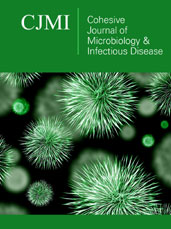- Submissions

Full Text
Cohesive Journal of Microbiology & Infectious Disease
Harnessing Microbiota For Innovative Strategies In Infectious Disease Control
Muhammad Zulqarnain*
Department of Agronomy, University of Punjab, Pakistan
*Corresponding author: Department of Agronomy, Faculty of Agricultural Sciences, University of Punjab, Lahore 54590, Pakistan
Submission: October 09, 2023; Published: October 31, 2023

ISSN 2578-0190 Volume7 issues1
Abstract
The intricate relationship between microbiota and infectious diseases is a subject of growing interest within the field of microbiology. As researchers delve deeper into the complex interactions occurring within our microbial communities, we find ourselves at the precipice of transformative approaches to infectious disease control. This opinion piece explores the uncharted territory of harnessing microbiota as a novel frontier for innovative strategies in infectious disease management. While this concept is relatively unexplored, it holds immense potential in our quest to combat infectious diseases effectively.
Introduction
Infectious diseases continue to pose significant threats to global public health. Despite remarkable advancements in medical science, emerging pathogens and the ever-present threat of antimicrobial resistance demand fresh perspectives and innovative strategies for disease control. One such perspective involves our own microbial inhabitants, collectively known as the microbiota.
Our microbiota, composed of a diverse array of microorganisms residing within our bodies, have co- evolved with us over millennia. They play pivotal roles in maintaining our health and influencing various aspects of our physiology, including our immune system. Recent research has unveiled their potential as an underutilized resource in our battle against infectious diseases.
Microbiota as a defensive arsenal
Our microbiota, predominantly residing in the gut, respiratory tract, and skin, form a defensive line against invading pathogens. Their ability to outcompete potential threats and modulate our immune responses has been the focus of extensive study. By better understanding the mechanisms through which our microbiota protect us, we can potentially engineer targeted interventions to enhance this natural defense.
Restoring microbiota balance
Dysbiosis, or imbalance within the microbiota, has been associated with various infectious diseases. Restoring balance through the use of probiotics, prebiotics, and Fecal Microbiota Transplantation (FMT) presents promising avenues for treatment and prevention. These interventions could serve as adjuncts to conventional therapies, enhancing their effectiveness and potentially reducing the development of antimicrobial resistance.
Microbiota as therapeutic agents
Beyond prevention, microbiota-based therapies could be employed as direct treatments for infectious diseases. Engineered probiotics, capable of producing antimicrobial peptides or interfering with pathogen colonization, could serve as living medicines. Such approaches may revolutionize the way we treat infections, particularly those that are challenging to manage with traditional antibiotics.
Challenges and ethical considerations
Despite the promise of microbiota-based strategies, several challenges must be addressed. Ensuring the safety and efficacy of such interventions, navigating regulatory hurdles, and addressing ethical concerns surrounding the manipulation of our microbiota are paramount. Additionally, interdisciplinary collaboration between microbiologists, immunologists, clinicians, and bioengineers is essential to drive these innovations forward.
Conclusion
The microbiota, often regarded as silent partners in our health, are emerging as active participants in our battle against infectious diseases. As we delve deeper into this uncharted territory, we stand on the brink of a microbial revolution in disease control. Harnessing our microbiota as a resource for innovative strategies in infectious disease management represents a paradigm shift-one that has the potential to transform our approach to infectious diseases and safeguard global public health in the face of evolving threats. It is imperative that we continue to explore this avenue with the same rigor and enthusiasm that has driven progress in microbiology and infectious disease research.
© 2023, Muhammad Zulqarnain. This is an open access article distributed under the terms of the Creative Commons Attribution License , which permits unrestricted use, distribution, and build upon your work non-commercially.
 a Creative Commons Attribution 4.0 International License. Based on a work at www.crimsonpublishers.com.
Best viewed in
a Creative Commons Attribution 4.0 International License. Based on a work at www.crimsonpublishers.com.
Best viewed in 







.jpg)






























 Editorial Board Registrations
Editorial Board Registrations Submit your Article
Submit your Article Refer a Friend
Refer a Friend Advertise With Us
Advertise With Us
.jpg)






.jpg)














.bmp)
.jpg)
.png)
.jpg)










.jpg)






.png)

.png)



.png)






